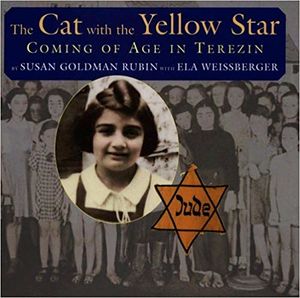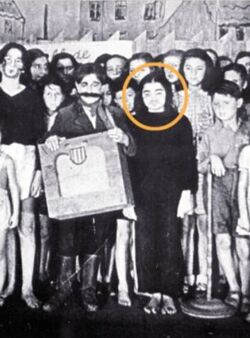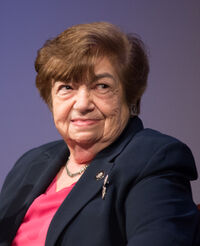Ela Weissberger / Ela Stein (F / Czechia, 1930-2018), Holocaust survivor
Ela Weissberger / Ela Stein (F / Czechia, 1930-2018), Holocaust survivor.
- One of the interpreters of the opera Brundibar
- One of the Girls of Room 28
- KEYWORDS : <Czechia> <Theresienstadt> <Brundibar> / <Liberation of Theresienstadt>
- MEMOIRS : The Cat with the Yellow Star (2006)
Biography
NOTES : Ela Weissberger (b.1930) was born in Czechia. Interned at Theresienstad. Was among the protagonists of the opera Brundibar. Liberated at Therenseinstadt.
She is one of the Girls of Room 28 featured in 2004 in Hannelore Brenner's book.
Book : The Cat with the Yellow Star (2006)
- The Cat with the Yellow Star: Coming of Age in Terezin (New York, NY: Holiday House, 2006).
"Ela Stein was eleven years old in February of 1942 when she was sent to the Terezin concentration camp with other Czech Jews. By the time she was liberated in 1945, she was fifteen. Somehow during those horrendous three-and-a-half years of sickness, terror, separation from loved ones, and loss, Ela managed to grow up. Although conditions were wretched, Ela forged lifelong friendships with other girls from Room 28 of her barracks. Adults working with the children tried their best to keep up the youngest prisoners' spirits. A children's opera called Brundibar was even performed, and Ela was chosen to play the pivotal role of the cat. Yet amidst all of this, the feared transports to death camps and death itself were a part of daily life. Full of sorrow, yet persistent in its belief that humans can triumph over evil; this unusual memoir tells the story of an unimaginable coming of age."--Publisher description.
Holocaust Memorial Center
Mrs. Ela Weissberger was born in 1930 and lived on the border of Germany in Czechoslovakia, which was the first place occupied by Hitler. Her father Max Stein was born in 1901 and her mother Margeta was born in 1905 in Moravia near Kiev. She has one sister, Ilona (Weinstock), who was born in 1926 and lives in Orangeburg, New York.
The Stein Family had twenty-four hours to evacuate their town or they’d be sent to Dachau. The family went to Prague to live with an uncle. The Germans took all their money and gave them ten marks to go over to the Czechoslovakian border. After two years, they were expelled from Prague.
They then lived with four families in a big apartment and had to register. In 1941, her transport was sent to Lodz. Her transport number was X896. There were twelve hundred in her transport car and only five returned. Mrs. Weissberger was then eleven years old.
Mrs. Weissberger was in Theresienstadt for three and half years. She lived in Barrack L410, the children’s barrack in Room #28. They were separated by age and in her room 90% were born in 1930. The two leaders were Ella Pollack and Eva Weiss who were both Zionists. They taught the children about Israel. Together the children made a flag and cut it in four pieces. They dyed a piece of sheet and embroidered the Hebrew words: MaaGal on the flag. They promised each other that, after the war, they’d meet and put the flag back together. The other three girls didn’t survive, but Mrs. Weissberger brought her piece to show at this interview.
In the barrack, there were forty girls and only eight survived. Helga Kinski, who lives in Vienna wrote a diary which was made into a movie. They speak often.
The leader, Ella, was a piano teacher who taught them Hebrew songs. They formed “Helping Hands” and went to the hospitals to sing and were asked to sing in a children’s opera, called,“Brundibar”. Hans Krasa wrote the opera and Pinchas Milstein had the lead role. He sang in “Bartered Bride” by Smetana. Mrs. Weissberger was the cat.There was also a milkman, a baker and a dog.
The group performed the opera fifty-nine times, Mrs. Weissberger never missing one performance. They were given cake with some sort of black sauce over it after each show. The children imagined that they were fighting Hitler and winning the war. They also imagined that the black sauce was chocolate.
Most of the children were sent to Bergen-Belsen and at the end of the war, there were only one hundred left from the original two thousand. There were no moreperformances after September 1944.
Ruthie Schechter slept next to Mrs. Weissberger in the barrack. Her parents went to Palestine in 1940 with the intent to bring the children after they settled. The children were sent to Theresienstadt and then to Auschwitz. Her brother Alex was selected by Mengele to be his assistant. Ruthie went straight to the gas chambers.
When the transport came from Theresienstadt, Alex went to help and saw a large boy named Rudy who didn’t fit into any clothes nor shoes. Alex got him big shoes and a large sweater and brought him cigarette butts from the German soldiers. Rudy said “When we get home from here, I’ll give you my accordion”.
Recently Mrs. Weissberger met with Alex in Israel and told him how he acquired the accordion which he had forgotten as he was in shock because his sister Ruthie had not survived. Their parents were told, through received postcards from the children, that all was well and they were in work camps. At first they were sent to build ponds for ducks, but they were really building the beginning of the Theresienstadtgas chambers that never got finished.
In March and April, the death march began. Mrs. Weissberger’s friend Helga returned to Theresienstadtand was unrecognizable. She had shrunken to half her size.
One girl, Hannah Hand, whose mother was Jewish, lived in the Kinder House. Eichman went to her room, accompanied by her Gentile father who had become a Nazi. She was told to get dressed and leave with her father. She refused and said, “Bring me back to my friends or kill me, I’m not going with my father”. She remained in Theresienstadt and died of typhus.
Mrs. Weissberger remembered that in 1943, someone brought in a tree for Lag B’Omer, saying a tree means life. The sapling grew and was transplanted to the cemetery in Theresienstadt in remembrance of the children. She also remembered that Mrs. Milstein, who took care of them, found a candle and they celebrated the Sabbath.
When Theresienstadt was liquidated, all the prisoners were given a piece of margarine, 100 grams of bread and a little jam and were shoved out of the camp. They were taken to a large area for 24 hours. Planes were overhead and then they were chased back into Theresienstadt.
Mrs. Weissberger said there were three thousand five hundred forty-one children and only one hundred survived. She said, “Some were so talented”. She then recited a poem.
There were seventy-three in her extended family including an uncle who was secretary to the Minister of social things in Prague. Only four returned from Theresienstadt: Mrs. Weissberger, her mother, her sister and one uncle.


